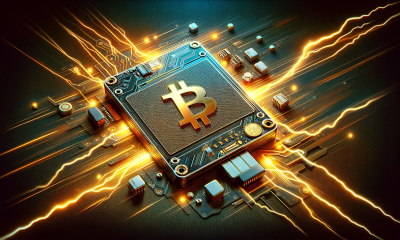Digital Assets
5 “Best” Digital Trading Card Games to Integrate NFTs
Securities.io is committed to rigorous editorial standards. We may receive compensation when you click on links to products we review. Please view our affiliate disclosure. Trading involves risk which may result in the loss of capital.

The gaming industry is a rapidly growing market that has been revolutionized by blockchain gaming with the introduction of exciting new concepts like Free-to-Play (F2P) and Player-to-Earn (P2E).
NFT (non-fungible tokens) trading cards are, in particular, becoming increasingly popular amongst game developers as well as players.
These games feature a unique economy where fungible tokens facilitate transactions in the marketplace, enabling players to buy or sell assets easily. This creates a vibrant gaming economy that fosters collaboration and competition through various types of transactions.
By integrating NFTs into their gameplay, digital trading card games are offering players new ways to interact with the game, as NFTs provide a unique and immutable digital asset that can be traded, sold, or exchanged. This allows players to have true ownership of their cards and also opens up new possibilities for game mechanics.
NFTs add a new layer of strategy and depth to digital trading card games as well as another level of customization and player expression.
So, let's take a look at the best digital trading card games that make the best use of NFTs.
1. Gods Unchained

A popular digital trading card game, Gods Unchained combines the classic elements of collectible card games with modern blockchain technology for a unique gaming experience. The game will soon be releasing its mobile version, which will further grow its adoption level.
Developed by a team led by Nick Clay (the former director of the Magic The Gathering Arena), Gods Unchained features a native token, $GODS, which is a $60 million market cap cryptocurrency that hit an all-time high of nearly $9 in Dec. 2021.
The game offers a large assortment of cards and card combinations to build powerful decks, allowing players to have the edge over their opponents in a unique card-battling system. Players don't have to spend money to buy tokens or assets to get started with Gods Unchained. Instead, free cards are automatically deposited into the account of users immediately after they sign up and open an account.
This free play-to-earn crypto game is based on the Ethereum Layer 2 solution Immutable X, which according to Dapp Industry Report 2022, was one of the few networks that were potent gaming ecosystems of the year. Besides Gods Unchained, the blockchain is home to the fantasy RPG Guild of Guardians and Illuvium.
Most recently, ImmutableX announced Immutable Passport, a simple, secure, and non-custodial onboarding solution designed for game studios that are being integrated by both Gods Unchained and Guild of Guardians. It is a wallet and authentication tool that streamlines onboarding for gamers through passwordless sign-on and automated wallet creation.
This solution will help gamers create and secure their unique online identities while allowing game studios to drive adoption across mainstream audiences, maintain enterprise-grade security, and access meaningful player analytics.
2. Skyweaver

This NFT trading card game allows players to buy, sell and trade digital cards with each other, battle AI bots, create virtual teams, and compete against other players.
Based on the Polygon network, Skyweaver was launched in February 2021 after months of private access-only gameplay. The game, however, has been developing since 2019, when Reddit co-founder Alex Ohanian led a $3.5 million funding round.
Skyweaver is designed to focus on multiplayer blockchain gaming and allows players to build decks with better cards featuring various characteristics and attributes to compete against each other.
What makes it more engaging than traditional card games is its unique “reality gaming” system. Players can also use their crypto wallets to purchase packs of cards that contain rare NFTs. These cards can also be sold for valuable cryptocurrency.
Earlier this year, the popular free Web3 fantasy play-to-earn collectible card game introduced its latest expansion – Hexbound Invasion, containing 50 new cards, new abilities, and new Sky Packs.
Skyweaver is built by Horizon Blockchain Games, which raised $40 million late last year in Series A funding, led by Brevan Howard Digital and Morgan Creek Digital and additional participation from Polygon, Ubisoft, Xsolla, Take-Two Interactive, The Sandbox co-founder Sebastien Borget, Sky Mavis and Axie Infinity co-founder Aleks Larsen, among other investors.
With the funds, Horizon plans to expand the content and reach of Skyweaver as well as invest in Web3 products, scale its operations, and work on Niftyswap. Niftyswap is an open protocol created to enable the seamless trading of cards instead of engaging in the bid/order/sell process.
3. Sorare

Sorare is another popular choice for digital collectors that offer football-themed cards based on real-world players and teams worldwide.
Back in 2021, during the bull market, Sorare raised $680 million in a Series B funding round led by Softbank at a valuation of more than $4 billion. The company has more than 3 million users.
Earlier this week, the Paris-based NFT startup closed a multi-year deal with the Premier League, the first soccer division in the U.K., to make teams and players of the league part of its roster. This means players of the game can now purchase and use official Premier League-licensed NFTs under the exclusive agreement. The four-year agreement involves payments of “tens of millions of pounds per year” to the league as well as allowing the Premier League to take a stake in the fantasy startup.
With this latest agreement, Sorare now boasts five of the most important European leagues on its platform, including the first soccer division in Spain, the Spanish La Liga. Earlier this month, Dutch soccer's top-flight team, the Eredivisie, also extended its partnership with Sorare for another three years.
Just late last year, the company announced a partnership with the National Basketball Association (NBA) to launch an NFT-based game featuring players and teams from the league and onboarded Argentine soccer superstar Lionel Messi as an investor and ambassador of the Sorare brand.
Amidst all this, Britain's gambling watchdog has been investigating Sorare while France's gambling regulator requires the company to make changes to the game.
Much like other names on this list, Sorare also has a native currency SOR, which is an ERC-20 token used for interaction and transactions on the platform. Holders can also stake the tokens for passive income or trade them for more Sorare NFTs.
4. Splinterlands

Splinterlands allows users to build customized decks using special cards they have collected or purchased using in-game currency. Each card has its own unique rarity rating, which can be exchanged for in-game rewards.
Jesse “Aggroed” Reich and Matt Rosen founded the blockchain video game in 2018. Based on the Hive blockchain, Splinterland boasts 2.4 million users and has partnered with the Major League Soccer Players Association (MLSPA) and Warner Music Group (WMG).
The game is known for its complex fantasy-themed auto-battler interface. Its unique gaming mechanics allows players to battle against monsters while they win prizes and crypto tokens in return.
Dark Energy Crystals (DEC) is Splinterland's in-game currency that hit an all-time high of $0.017 in Oct. 2021. The more battles a player wins, the more DEC they own.
The game also features Splintershards (SPS), which serve as the game's governance token. SPS is a $15 million market cap cryptocurrency worth as much as $1.10 at its peak in June 2021.
According to Dapp Industry Report 2022, Splinterlands remains the most popular game of the year with 217,914 monthly unique active wallets (UAW). The game has shown resilience throughout the year, representing an 85.78% growth in UAW.
5. Spells of Genesis

Last but not least is Spells of Genesis which offers unique video game experiences with its own virtual in-game currency as well as tradable NFTs. It offers a collectible card game format with a games marketplace where players can buy and sell their cards in a real-world economy.
Spells of Genesis, or SoG, was created by EverdreamSoft in 2015. In 2020, it officially supported Ethereum, which boosted its sales.
The free play-to-earn game is compatible with multiple blockchains and focuses on mobile device users, and is available on both Apple's App Store and Google's Play Store.
SoG features three different in-game currencies: gold, crystals, and gems. Gold can be used to buy new in-game cards and received by successfully completing levels and quests, winning a raid, playing the Challenge mode, and being among the top 100 players on the monthly leaderboard.
Crystals, meanwhile, are created by crystallizing cards and can be used to upgrade or fuse your cards. At last, Gems can be purchased in the Shop and used to refill stamina or to purchase cards with a guarantee of a higher card rarity.
Last year, SoG took the next step in its Metaverse push by taking its Spells of Genesis – Askian Door social hub in The Sandbox, enabling players to come face-to-face with their favorite in-game characters. They also launched a Showroom in the virtual world of CryptoVoxels to commemorate its 5th anniversary.
Final Word
All in all, these five digital trading card games — Gods Unchained, Skyweaver, Sorare, Splinterlands, and Spells of Genesis — make for great options when it comes to collecting digital assets while also providing a fun gaming experience. All these games can be very enjoyable and lucrative opportunities for those interested in the crypto gaming world.









